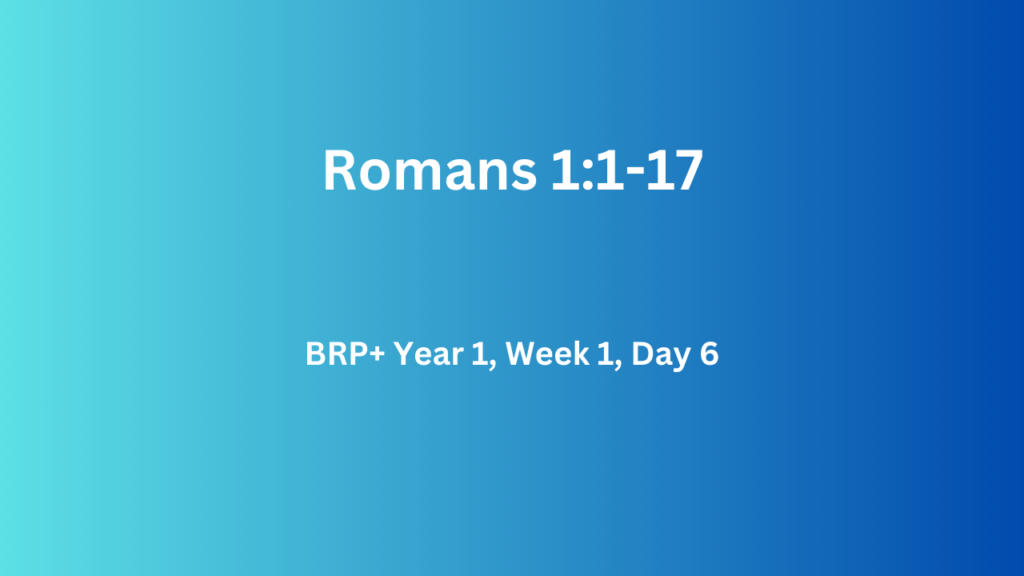Romans 1:1-17
Q.1. Was Paul’s calling different from ours? How did he describe the gospel? What makes the gospel powerful? How widely is the gospel relevant? Why is obedience of faith important? – (Rom.1:1-6)
All of us who are foreknown, are called to His purpose (see Rom.8:28-29). However, Paul had a unique call to be the apostle to the Gentiles (see Rom.1:1). We usually refer to the gospel as ‘the gospel of Jesus Christ’. Here Paul went back to the heart of God from the beginning and called it – the gospel of God (Rom.1:1). This gospel was not new. Paul connected it to the historic message given by the prophets in the Scriptures (see Rom.1:2). The focus of the gospel is God’s Son – … who was born of a descendant of David according to the flesh (Rom.1:3). It is not ‘Good News’, if a founder of a religion is unable to defeat death, because this fails to give the followers any substantial hope beyond the grave. Paul declared about Jesus, that His claims were authenticated, when He – was declared the Son of God with power by the resurrection from the dead, according to the Spirit of holiness, Jesus Christ our Lord (Rom.1:4). As the apostles proclaimed, death could not hold Him in its power because God’s Son was sinless and holy (see Acts 2:24-32; 13:30-37). Since death stalks all people, this gospel is a relevant and urgent message for the whole world. Paul understood that believers have – … received grace and apostleship to promote obedience to the faith and make disciples for His name’s sake among all the nations (Rom.1:5).
Q.2. Why was Paul thankful for the Roman believers? What was his prayer for them? Why did the gospel inspire Paul to reach others? What difference did he hope his ministry would make? – (Rom.1:7-15)
Paul sent his greetings to the saints at Rome (i.e. those made holy ones by faith in Christ). He was thrilled about their genuineness – … because your faith is being proclaimed throughout the whole world (Rom.1:8). Paul prayed unceasingly for them, with a special request that – 10 … at last by the will of God I may succeed in coming to you. 11 For I long to see you so that I may impart some spiritual gift to you, that you may be established … so that I may obtain some fruit among you also, even as among the rest of the Gentiles (Rom.1:10-11 & 13). Paul previously had been aggressively opposed to the gospel, so his conversion and call brought with them a sense of obligation (see Rom.1:14). He longed to prove his love for God, by producing fruit amongst both Jews and Gentiles: the wise and the foolish, and the cultured and uncultured. Paul never got over the wonder of his conversion and call to preach the gospel.
Q.3. Why was Paul enthusiastic about the gospel? Are the Jews more deserving of the gospel? How do people demonstrate that their faith is genuine? – (Rom.1:16-17)
Paul was enthusiastic about the gospel, because it was the most crucial need of all sinners. He felt no shame in identifying with or sharing the gospel. Though opposition was strong, there was no other message on earth that could claim to be – … the power of God for salvation to everyone who believes, to the Jew first and also to the Greek (Rom.1:16). Some interpret the order mentioned as a command to always give priority to the Jews. It is clear from the closing Chapter of Acts, and also Paul’s explanation of the mystery of the church, that there was a transition from Jew to Gentile (see Acts 28:28; Eph.3:1-11). Paul reported the order that the gospel was proclaimed first to Israel, and then the Gentiles (see Acts 1:8; Rom.11:11-24). He then set forth the thesis which he would unfold in the rest of the book of Romans – For in the gospel the righteousness of God is revealed from faith to faith; as it is written, “But the righteous man shall live by faith.”(Rom.1:17). It is God Who arouses our faith and enables us to embrace the Saviour. Real faith also produces a heart that wants to express this with a life that is pleasing to God (see Rom.1:5, 14).

